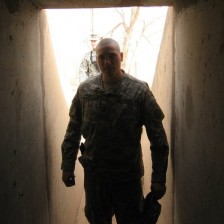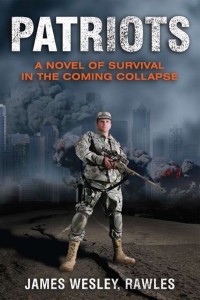I have to give thanks to my brother for another great book review. I’ve also read this book but was introduced to it from another source. Among prepping circles this will typically be among the top recommended books. Personally I think the story telling is good but not superb; but the information and other literature by the author is timeless. If you’re not a prepper this book will help you understand the mindset. This is a piece of literature worth the purchase and highly recommended as an introductory book. When you read it and other similar books, underline and/or take notes.
Jon
There I was sitting in Iraq looking for something to read and I happened to pick up a copy of Patriots: A Novel of Surviving the Coming Collapse, by James Wesley Rawles. After reading this book my mind was blown; I have always been a very likeminded person when it comes to preparing for bad situations. Coming from a family that has always been avid prepares in their own way through such things like food storage and self-sufficient living. This book took me from being the novice prepper to being obsessed with the topic. Since that day I have devoted time and money to prepping for whatever the future may bring.
This book made its first appearances in different versions and formats throughout the early 2000’s. This book follows a group of preppers after an economic collapse in the U.S., which throws the country into complete shutdown and anarchy. Upon deciding to review this book I did some quick searches online on other people’s reviews of this book just to see what the general consensus was on this book. I was shocked to find that most people’s opinions were very negative on this book. People felt that it lacked the key traits which define a good novel; it read to most people more like a user manual. I could not disagree more. It has great story line and plenty of fiction to draw you in; the fact that it is overloaded with in depth information is what makes this book so unique and amazing. When I read a book I do not just want to know that a character grabbed his B.o.B. and took off for the hills. I want to know what type of bag he chose; is it a military bag, internal or external frame, or just a run of the mill hiking bag. I want to know everything that the character thought was important to have during a life or death situation. This is something that Rawles is able to capture in his books. How many times have you read a book or watched a movie and it has the cliché montage of a character doing something and you find yourself wondering how the hell did he do that, or what did he use to make that homemade bomb he just constructed from stuff you could find in a maintenance closet. Rawles does not just mention that all his main characters have a card with compatible blood types for emergency blood transfusion information; he lists exactly what is printed on the card.
I have always recommended whenever doing anything that involves prepping to keep a pen and paper at the ready so you can write anything that might be useful. Whenever I read books whether they are just fictional novels on end of the world scenarios or they are actual manuals on survival I take vast amounts of notes. While reading Patriots I filled a little green note book full on everything from B.o.B. info to homemade defense systems. With these notes I made the largest leap to being more prepared than I had ever been.
Survival and prepping has become a very profitable industry in the world as late. One contribution to this is the current trend of literature and TV which has made something special out of what in the 1960’s had been considered a hippie trend that would likely die out. As much I dislike the hippie mindset it has set the foundations in which that prepping self-sufficient like mindedness has made its appearance into the main stream of society. Talking with friends and fellow preppers I have found one general trend; Patriots is the single book that most people have contribute to influencing them.
In an article by Sarah Nelson titled The Most Dangerous Novel in America?; she labels patriots as being a bestselling manifesto. In her article she goes on to say; According to one Amazon reviewer, Patriots is “one of the best researched books, ever.” Admits another “who’s not a big book reader,” it’s unputdownable. In fact, pretty much the only thing fans of the book seem to squabble over is whether the story of a band of survivors of a collapsed world should be called a novel or a survival guide.”
Later in the article she had an interview with Rawles,
Your book exhibits a very definite philosophy about the world and how we can and should live. Can you describe that philosophy?
My basic philosophy is that we live in a very fragile society, and the recognition of that leads logically to the conclusion that people need to be better prepared than most are. Some people call it “Guns and groceries” survival. You can’t rely on the government’s infrastructure. There are going to be crises, and natural disasters—Hurricane Katrina is a perfect example. People need to be self-sufficient, and have a deep larder—it’s primarily about food storage and water filter for water you’ll have to gather for yourself. For the majority of my readers who either live in the suburbs or the countryside, they can store six months’ or a year’s worth of food. For someone living in a major metropolitan area, they might only have room for two- or three-months’ supply of food.
What about the “guns” part of the equation?
I look at guns as any other tool for survival : A gun is an inanimate object that has a purpose, like a claw hammer. You can build a house with it, or bash someone’s head in with it. Its value is in the user. I look at guns as tools, either for self-defense, or as tools for hunting small or big game.
Why do you think the novel has taken off as it has? Do you have a clear sense of who your reader is?
I did originally [when I started writing about this topic] have an idea of who my reader is. But the readership of my blog has changed to the point that it’s really now mass market. I have 135,000 readers on the blog—they’re on every continent but Antarctica. If I had said three years ago that there was going to be an economic crisis triggered by derivatives and that it would bring down the banking empire and even the government, people would have said I was crazy—but that’s exactly what has happened. So, recognizing that these threats are real and manifest has greatly widened the appeal of the novel: Everyone from little old ladies to software programmers in India want to read my book.
Do you think of the book, or your message, as faith-based or evangelical?
It’s not really a religious book, but it does portray a lot of characters who are deeply religious. But it’s not out there proselytizing. I’m not shy about the fact that I’m a Christian, but one of the characters based on a close friend of mine, is an Orthodox Jew.
Still, you make some points about preferring orthodoxy, of whatever particular religion, to people, even Christians, who are not particularly devout.
I think that people should choose their friends wisely. It’s in people’s best interests to associate with people of the same faith. I generally recommend that people pick religious people for neighbors because they’re going to be the most law-abiding and trustworthy in a crisis, because they’re God-fearing. If I had a Bahai as a next-door neighbor, I’d feel much safer than someone who was a Marilyn Manson fan.
Why are you so secretive about your personal life, even down to what area code you live in?
I’m not at liberty to discuss where I live. It’s part of an agreement I made with my wife. I really can’t go into the details. We live in a very remote area. I embrace technology. We don’t live in a cellphone area, but I’m online constantly. We’re just prepared to live off-grid, if the power grid goes down.
Because of the nature of my blog and my novel, I don’t just want anonymity, I need anonymity. I could wake up some morning in the aftermath of some crisis and look out in my barnyard and see five Winnebagos and some TV crews. I don’t want fans of my books to descend on my property, so I have to be perspicacious.
You obviously don’t have a lot of faith in the government to solve the current financial crisis—or pretty much any crisis you can imagine. What do you think of what the Obama administration has been doing so far?
I personally think the government is handling this in the wrong way. They’re attempting to reinflate the asset bubble. What they need is to allow bankruptcy to occur, and there are a lot of malinvestments in the system that need to work their way through the system. Unless that is allowed to happen, government is going to continue to bailout—to the tune of trillions and trillions of dollars—noncredit-worthy organizations…. In the long run those investments are going to bankrupt the country and destroy the dollar as a currency unit.
I think that we’re going to end up like the German Weimar Republic of the 1920s.
I hope you’ve enjoyed my personal insight into a great book. Give it a read and if you think it is worth it; or it inspires your direction, pass it on. If you think the book is crap throw it away and I won’t think less of you.
Dave


Leave a Reply